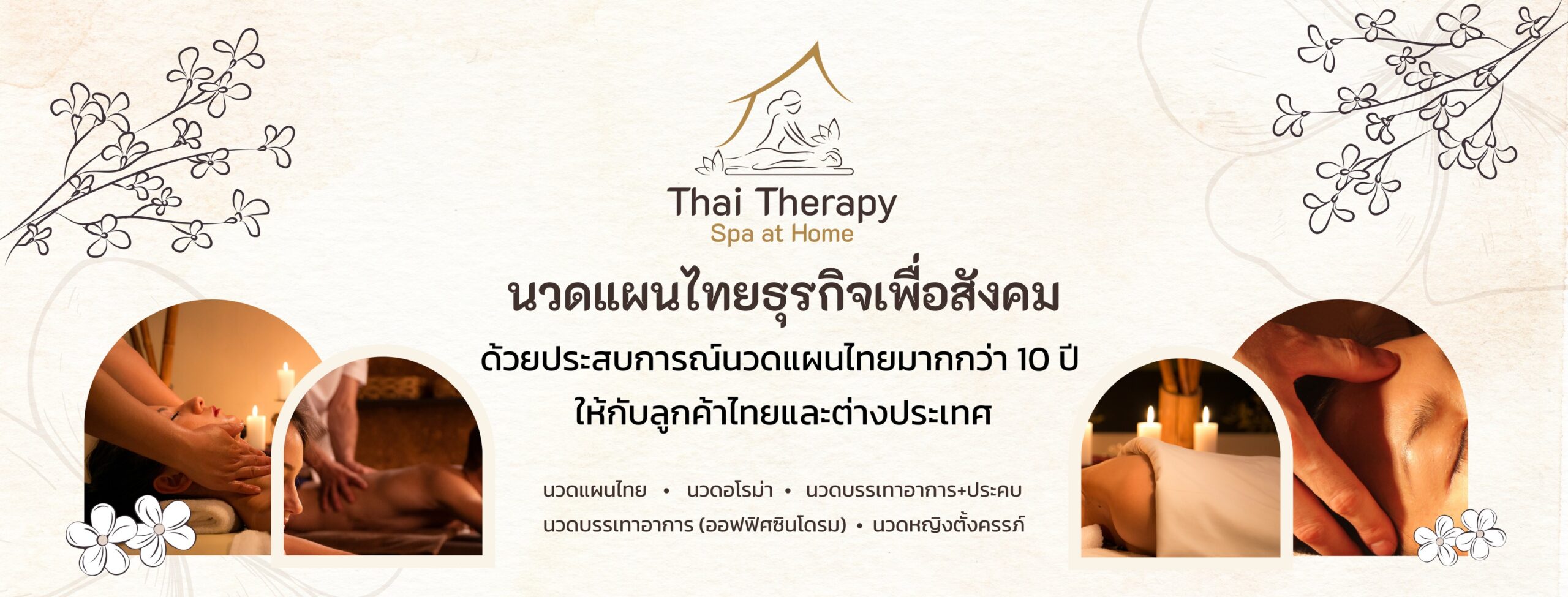(อ่านภาษาไทยด้านล่าง)

The massage therapy profession in Thailand is shaped by both public perception and employment structures. Many people wrongly associate massage therapists with sex work, leading to stigma and misunderstandings that affect their work environment. In terms of employment, therapists work in different settings but face similar challenges. Some massage therapists work as employees in massage parlors with strict rules and systemic exploitation, while others are freelancers or platform-based therapists who face risks such as sexual harassment and job insecurity. Despite being an iconic profession that contributes significantly to Thailand’s global reputation, massage therapists remain fragmented across various sectors, making collective organizing a challenge.
Around three years ago, a Facebook group called Thai Therapy Spa at Home emerged, providing a platform for clients to easily book home-based massage services. But how did this group of massage therapists come together?
In 2019, just before the COVID-19 pandemic, a small group of therapists began discussing ways to improve their quality of life. Initially, the group focused on sharing job opportunities among members without any fees. As the group grew, deeper issues came to light, such as the lack of social protections for freelancers and platform-based workers. Seeing colleagues struggle with the uncertainty of their work, the group began to consider how they could create a more concrete solution to improve both job security and the welfare system.
From Informal Network to Social Enterprise
Starting with 12 founding members and around 60-70 participants, the group sought guidance from the Just Economy and Labor Institute on forming a collective. The group transitioned into a social enterprise in 2023, aiming to provide fair employment opportunities and welfare benefits for massage therapists without pursuing profit.
The social enterprise now operates with a more structured system. Job assignments are distributed by district in Bangkok, ensuring fair access to work. Members can consult the group for support when facing challenges, and the organization is working to establish a welfare fund by allocating 20% of earnings from each massage session.
Building the Future
At present, the social enterprise has also encountered structural challenges that need to be addressed for long-term growth. During recent meetings, members worked on a comprehensive plan to improve management, strengthen financial stability, and enhance public outreach. The group has decided to adopt a new name and will soon rebrand as Thai Care Co-Op, reflecting its cooperative structure and broader goals.
Looking ahead, Thai Care Co-Op aims to deepen its impact by building a robust foundation for collective action. Advanced massage therapists within the group are mentoring less experienced members for skill development and professionalism. Efforts are also underway to promote the massage therapy profession through a strategic social media presence, which will highlight its cultural and economic value.
By addressing these structural issues and focusing on sustainable development, Thai Care Co-Op is not only improving the livelihoods of massage therapists but also demonstrating that such change is possible across other professions. The key to success lies in the strength of collective efforts, understanding the challenges faced by workers in various fields, and supporting one another to create real and practical change.
Organizing labor through a social enterprise model presents one innovative way to tackle labor challenges. By blending social objectives with sustainable business practices, this model provides much-needed protections for underserved workers like freelance and platform workers.
Thai Therapy Spa at Home stands as a powerful example of what can be achieved when workers come together. While there is still a long road ahead, the group is also paving the way toward greater labor equity in Thailand.
Special thanks: Kettida Kotsongkram, massage therapist and coordinator of Thai Therapy Spa At Home.
กิจการเพื่อสังคม (Social Enterprise): ทางเลือกในการจัดตั้งแรงงาน ของหมอนวดไทย
“หมอนวด” เป็นอาชีพที่มีหลากหลายมิติในประเทศไทย ตั้งแต่การรับรู้ของคนทั่วไปจนไปถึงรูปแบบการจ้างงาน หมอนวดมีการจ้างงานทั้งแบบพนักงานในร้านนวด “หมอวิ่ง” แบบฟรีแลนซ์ หรือหมอนวดแพลตฟอร์ม แต่ใดๆ แล้ว หมอนวดมักเป็นอาชีพที่ถูกเอารัดเอาเปรียบได้ง่าย สำหรับหมอนวดที่ประจำอยู่ร้านก็มีข้อกำหนดมากมาย ในบางร้านหากหยุดหรือลางานอาจต้องจ่ายค่าเสียผลประโยชน์ให้กับร้านด้วย ส่วนหมอนวดฟรีแลนซ์และแพลตฟอร์มก็เสี่ยงอันตรายจากการโดนล่วงละเมิดทางเพศและการไม่มีหลักประกันในอาชีพ ทั้งยังถูกมองหรือเข้าใจผิดจากลูกค้าว่าเป็น sex worker ทำให้สภาพการทำงานยิ่งยากเข้าไปอีก ทั้งๆ ที่เป็นอาชีพสำคัญ สร้างชื่อเสียงและมูลค่าทางเศรษฐกิจให้กับประเทศไทยอย่างมาก และด้วยลักษณะที่มีความกระจัดกระจายของอาชีพหมอนวดก็ทำให้ยากต่อการรวมตัวเป็นกลุ่มก้อนได้
เมื่อประมาณ 3 ปีก่อน เพจ Facebook ชื่อ “Thai Therapy Spa At Home” ได้เริ่มเปิดตัวขึ้น โดยที่ผู้ใช้งานสามารถเข้าไปติดต่อเพื่อนัดหมายรับบริการนวดสปาตามบ้านได้อย่างสะดวกสบาย แล้วหมอนวดกลุ่มนี้มารวมตัวกันได้อย่างไร? ย้อนกลับไปช่วงก่อนที่จะเกิดโรคระบาดโควิด-19 ในปี 2019 เริ่มมีกลุ่มหมอนวดจำนวนหนึ่งพูดคุยกันว่าจะทำอย่างไรได้บ้างให้เพื่อนร่วมอาชีพสามารถรวมตัวกันเป็นกลุ่มเพื่อพัฒนาคุณภาพชีวิตร่วมกันได้ ในช่วงแรกจึงเป็นการรวมกลุ่มเพื่อช่วยกันหาและกระจายงาน ใครมีงานเข้ามาก็มาจ่ายงานให้เพื่อนโดยไม่คิดค่างานหรือค่านายหน้า
เมื่อกลุ่มเริ่มเติบโตขึ้นเรื่อยๆ ปัญหาที่ใหญ่กว่าก็เริ่มปรากฎให้เห็นชัดเจน ทำให้เกิดคำถามตามมาว่า เพื่อนหมอนวดที่รับงานแบบฟรีแลนซ์หรือแพลตฟอร์มที่ต้องเผชิญกับความไม่มั่นคงทางอาชีพและการใช้ชีวิต จะเป็นไปได้ไหมที่นอกจากจะช่วยหางานให้เป็นครั้งคราวแล้ว ยังมีหนทางที่เป็นรูปธรรมในการยกระดับความมั่นคงทางอาชีพและสวัสดิการของสมาชิกกลุ่ม?
ในช่วงแรกกลุ่มมีผู้ร่วมก่อตั้งทั้งหมด 12 คน และสมาชิกประมาณ 60-70 คน โดยสถาบันแรงงานและเศรษฐกิจที่เป็นธรรมให้คำปรึกษาในเรื่องการรวมกลุ่มจัดตั้ง และช่วยเหลือสนับสนุนในการริเริ่มดำเนินงานจนได้พัฒนามาเป็นรูปแบบของกิจการเพื่อสังคม (Social Enterprise) ในปี 2023 โดยมีจุดประสงค์ให้เกิดการจ้างงานหมอนวดและระบบสวัสดิการโดยไม่แสวงหาผลกำไร ซึ่งปัจจุบันการดำเนินงานเริ่มเข้มแข็งขึ้นอีก มีการจ่ายงานให้สมาชิกแบบแบ่งเขตในพื้นที่กรุงเทพมหานคร ทำให้หมอนวดมีงานมีรายได้ เมื่อเกิดปัญหาก็สามารถปรึกษากันในกลุ่มได้ โดยที่กลุ่มอยู่ระหว่างการสร้างระบบกองทุนจัดสวัสดิการ โดยจะเก็บจาก 20% ของส่วนแบ่งค่าบริการนวดที่ได้ในแต่ละครั้ง ในขณะนี้ที่ระบบสวัสดิการยังไม่สมบูรณ์ ภายในกลุ่มก็ไม่ได้นิ่งนอนใจต่อปัญหาของเพื่อนสมาชิกและมีการหนุนช่วยกันผ่านการเรี่ยไรเงินเพื่อสมทบช่วยเหลือไปตามกรณี
ปัจจุบัน กลุ่มก็ยังคงเผชิญกับความท้าทายด้านโครงสร้างที่ต้องหาทางแก้ไขต่อไปเพื่อการเติบโตในระยะยาว ในการประชุมครั้งล่าสุดของกลุ่ม สมาชิกได้ร่วมกันพัฒนาแผนที่ครอบคลุมเพื่อปรับปรุงการบริหารจัดการ เสริมสร้างความมั่นคงทางการเงินและการประชาสัมพันธ์เพื่อเข้าถึงสาธารณะ โดยกลุ่มได้ตัดสินใจที่จะเปลี่ยนชื่อและรีแบรนด์เป็น “Thai Care Co-Op” ในเร็วๆ นี้ เพื่อสะท้อนโครงสร้างแบบสหกรณ์และเป้าหมายที่กว้างขึ้นจากเดิมที่รับเฉพาะกลุ่มหมอนวด ก็จะขยายขอบเขตไปถึงคนทำงานดูแลในรูปแบบอื่นๆ ด้วย เช่น แม่บ้านหรือพี่เลี้ยงเด็ก
เมื่อมองไปข้างหน้า ทางกลุ่มตั้งเป้าหมายที่ลึกซึ้งยิ่งขึ้นเพื่อให้เกิดผลลัพธ์ที่มีประสิทธิภาพมากที่สุด โดยการสร้างรากฐานที่เข้มแข็งเพื่ออำนวยความสะดวกในการรวมกลุ่ม หมอนวดที่มีประสบการณ์มากจะช่วยเหลือให้คำแนะนำกับสมาชิกที่มีประสบการณ์น้อยกว่าเพื่อพัฒนาทักษะและความเป็นมืออาชีพ และจะมีการนำเสนอผ่านสื่อสังคมออนไลน์เพื่อส่งเสริมอาชีพนวดไทยด้วย ซึ่งจะทำให้เกิดความตระหนักถึงคุณค่าทางด้านวัฒนธรรมและเศรษฐกิจของอาชีพหมอนวดด้วยการแก้ไขปัญหาทางโครงสร้างเหล่านี้และมุ่งเน้นที่การพัฒนาอย่างยั่งยืน
Thai Therapy Spa At Home หรือ Thai Care Co-Op ในอนาคต ไม่เพียงแต่จะช่วยปรับปรุงชีวิตความเป็นอยู่ของหมอนวดเท่านั้น แต่ยังแสดงให้เห็นว่า การเปลี่ยนแปลงนี้สามารถเกิดขึ้นได้กับอาชีพอื่นๆ ด้วย กุญแจสู่ความสำเร็จอยู่ที่การร่วมมือกันอย่างเข้มแข็ง การเข้าใจถึงความท้าทายที่เพื่อนร่วมอาชีพต้องเผชิญ และการสนับสนุนซึ่งกันและกันเพื่อสร้างการเปลี่ยนแปลงที่แท้จริงและเป็นรูปธรรม
การจัดตั้งแรงงานในรูปแบบกิจการเพื่อสังคม (Social Enterprise) ก็เป็นแนวทางที่สร้างสรรค์ในการแก้ไขปัญหาด้านแรงงานและส่งเสริมความเป็นธรรมในสังคม โดยมุ่งเน้นการผสานเป้าหมายทางสังคมเข้ากับการดำเนินธุรกิจที่ยั่งยืน โดยเฉพาะในกลุ่มแรงงานที่ไม่ได้รับการคุ้มครองอย่างเพียงพอ เช่น แรงงานแพลตฟอร์มหรือแรงงานข้ามชาติ
Thai Therapy Spa at Home เป็นตัวอย่างหนึ่งของความเป็นไปได้ที่เกิดขึ้นเมื่อคนทำงานมารวมตัวกัน ถึงแม้ว่าหนทางข้างหน้ายังอีกยาวไกลและต้องใช้ระยะเวลาในการฟูมฟัก แต่กิจการเพื่อสังคมนี้ก็ยังคงเป็นแนวทางตัวอย่างในการสร้างพลังและความเท่าเทียมด้านแรงงานให้เกิดขึ้นในประเทศไทย
ขอขอบคุณ: เกษธิดา โคตรสงคราม – หมอนวดและผู้ประสานงานกิจการเพื่อสังคม Thai Therapy Spa at Home
